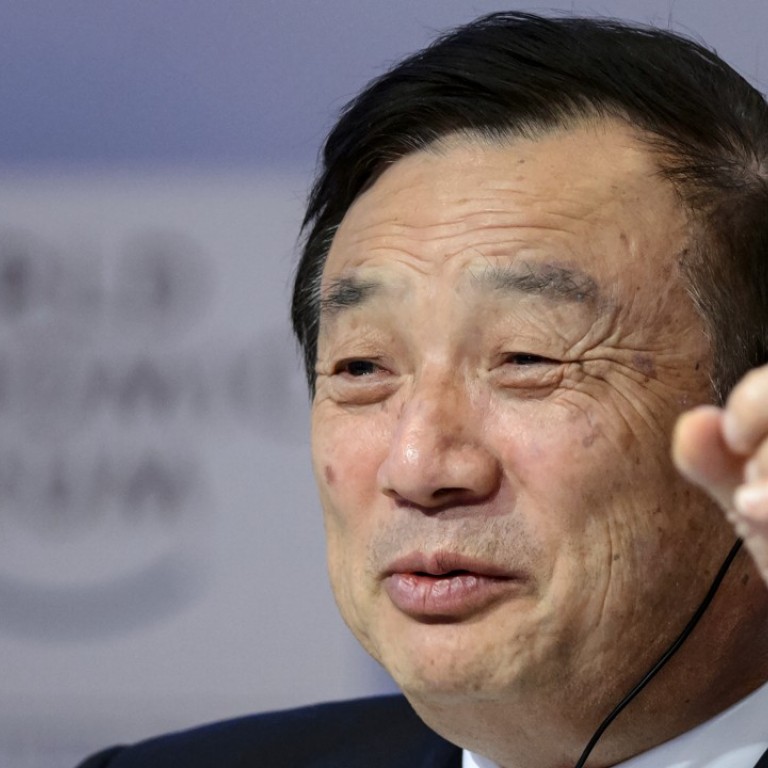
Exclusive | Huawei founder urges employees not to harbour anti-US sentiments
Ren Zhengfei, the founder and chief executive of telecoms equipment maker Huawei, says employees must possess a “sense of crisis” amid simmering tensions between China and the US
The founder of Huawei Technologies, the Chinese telecommunications equipment manufacturing giant that the US has deemed a national security risk, has urged employees not to harbour any anti-US sentiments amid simmering tensions between the world’s two largest economies.
Huawei founder and chief executive Ren Zhengfei told employees to “never let anti-US sentiment guide our work”, according to a memo addressed to several departments, dated April 8 and seen by the South China Morning Post.
He also urged employees not to harbour nationalist sentiments, and to recognise the “strengths of the US, see the gap [between Huawei and its US competitors] and learn from them”.
More ‘genuine’ than Apple: Huawei is most reputed Chinese brand
The memo was circulated to staff weeks after US President Donald Trump threatened to impose some US$150 billion in tariffs on Chinese imports, but before the US imposed a seven-year export ban on ZTE Corp for violating sanctions on selling telecoms equipment to Iran and North Korea.
The ban has threatened the survival of Huawei’s cross-town rival in Shenzhen and became a focal point in the US-China trade talks.
Huawei, ZTE customers in the US find themselves in limbo
Huawei, the world’s largest telecoms equipment supplier and China’s biggest smartphone brand, was also reported to be under investigation for violating US trade sanctions on Iran, according to The Wall Street Journal, which cited unnamed sources.
Huawei declined to comment on the memo.
The memo from Ren has come as a surprise because of the setbacks faced by Huawei in its efforts to expand operations in the US. Privately held Huawei has seen its network equipment and smartphone sales flourish over the past few decades across the world.
Huawei is in better shape to withstand US pressure than ZTE
The US, however, remains concerned about Huawei’s ties with the Chinese government. It is a major security issue that has stymied efforts by the company and Hong Kong-listed ZTE to sell network equipment to large US telecommunications carriers.
Security concerns were widely reported to have prompted US carrier AT&T to walk away from a smartphone distribution deal with Huawei ahead of the Chinese firm’s launch of its flagship Mate 10 Pro handset at the CES trade show in Las Vegas in January this year. Later it was reported that Verizon Communications also abandoned plans to distribute Huawei’s smartphones in the US.
Chinese tech company Huawei probed ‘for violating US sanctions on Iran’
Richard Yu Chengdong, the chief executive of Huawei’s consumer business group, accused the US government and some competitors for playing politics to keep the Chinese company out of the US market.
Huawei distanced itself from those comments, saying Yu was not authorised to make such statements on behalf of the company.
Two Republican senators introduced legislation in February that would block the US government from buying or leasing telecoms equipment from Huawei or ZTE, citing concern that the Chinese companies would use their access to spy on US officials.
US Senators propose bill to block equipment from Huawei, ZTE
In the lengthy memo, Ren raised the example of the late Chinese leader Deng Xiaoping, who was purged three times in his nearly 50 years in the Communist Party.
Deng, who succeeded Mao Zedong as China’s paramount leader from 1978 to the early 1990s, guided China to open up its economy to the world.
“As a great leader, Deng Xiaoping also went through three periods of success and three periods of setbacks,” Ren wrote. “Company leaders who have been demoted … should take the opportunity to improve their abilities and achieve greater results in the future.”
Huawei lays off US staff after years of suspicion from China hawks
Ren encouraged Huawei employees to engage in group discussions to play out various geopolitical scenarios that anticipate different potential actions that various interests may take, citing the US-China trade tensions, competition between the US and Russia, and the century of Middle East sectarian conflict.
He also urged Huawei’s staff “not to be blindly optimistic” and to possess a “sense of crisis”.


